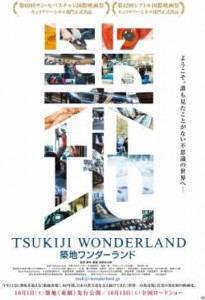“Tsukiji Wonderland” – Film Review from the 20th JFF (Australia)
By Eden Law (Fukushima ALT 2010-2011, JETAANSW President, Australian Country Representative), writing from Sydney, Australia. The Japanese Film Festival in Australia is the one of the biggest Japanese film festival in the world.
The Tsukiji Fish Markets are a staple in every Tokyo tourist guidebook, promoted as the place for serious foodies (or at least, lovers of seafood) to visit, and to sample the myriad of restaurants and shops in the area, may of which are food-related (ever been in a knife-only shop? Simultaneously amazing and terrifying). With the 2020 Tokyo Olympics however, the area is slated for redevelopment, and this film may be the final recording, at least of this current incarnation, of the market that has lasted over 80 years.
Once you get past a slow start and the voiceover, the film settles confidently into its subject matter. The documentary is divided into several chapters that deal with various aspects of the marketplace, such as the rhythms of the marketplace, where normal trading hours happen at a time most of us would be sleeping, particularly to cope with time zones and overseas customers: such is the reputation of Tsukiji that fish here may even end up as far away as the west coast of America. Business practices are also examined – the auction markets (where tourists are briefly glimpsed – access to these early morning sessions for the best tuna are highly restricted in order not to impede normal operations), interaction of vendors and buyers, and perhaps potentially controversial, the brutal practicality of fish preparation and storage.
While there are definitely plenty of shots of sushi and dishes on hand (film advisory warning: do NOT watch if hungry, or even slightly peckish), it is the people interviewed, especially the intermediary wholesellers who provide the bulk of the dialogue, that make for riveting viewing. The wholesellers’ understanding of their product is unrivalled and complete – one wholesaler specialised only in conger eels, able to reliably differentiate between what looked like identical fish quickly and easily with a glance. The faith of their highly discerning clients are complete, but only because they have earned them through honesty, consistency and reliability, favouring and anticipating the needs of their devoted customer base. Everyone – customers, vendors and academics alike – can’t help but stray into mystical and poetic descriptions when talking about the work, or the skills and knowledge of the vendors. It’s a thoroughly Japanese quality, where the people find pride and honour in their vocation, and it’s hard not to feel respect for them, which they most certainly deserve.
‘Tsukiji Wonderland’ can only skim the surface of the complex relationships of Tsukiji, but you can already get a sense of the rich mercantile tradition and customs that bind the merry band of workers here, constantly competing, jostling and supporting each other. The long, measured long shots over the marketplace gives it an epic and majestic field, and the many little work vehicles move as if dancing to music. The film does discuss the future of the market, particularly in light of changing diet habits and fast food. While there is sadness about the uncertainty of Tsukiji’s future, the film stays on a celebratory and affectionate mood, about the cultural institution of the world’s most famous fish market.
Tsukiji Wonderland (Tsukiji Wandarando) by Shotaro Endo, released October 1, 2016.



Comments are closed.